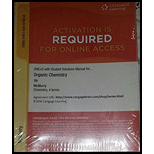
OWLv2 with Student Solutions Manual eBook, 4 terms (24 months) Printed Access Card for McMurry's Organic Chemistry, 9th
9th Edition
ISBN: 9781305671874
Author: John E. McMurry
Publisher: Cengage Learning
expand_more
expand_more
format_list_bulleted
Concept explainers
Textbook Question
Chapter 15.SE, Problem 51AP
Expert Solution & Answer
Trending nowThis is a popular solution!

Students have asked these similar questions
Laminar compounds are characterized by havinga) a high value of the internal surface of the solid.b) a high adsorption potential.
Intercalation compounds have their sheetsa) negatively charged.b) positively charged.
Indicate whether the following two statements are correct or not:- Polythiazine, formed by N and S, does not conduct electricity- Carbon can have a specific surface area of 3000 m2/g
Chapter 15 Solutions
OWLv2 with Student Solutions Manual eBook, 4 terms (24 months) Printed Access Card for McMurry's Organic Chemistry, 9th
Ch. 15.1 - Prob. 1PCh. 15.1 - Give IUPAC names for the following compounds:Ch. 15.1 - Prob. 3PCh. 15.2 - Pyridine is a flat, hexagonal molecule with bond...Ch. 15.3 - Prob. 5PCh. 15.4 - Draw the five resonance structures of the...Ch. 15.4 - Prob. 7PCh. 15.4 - Prob. 8PCh. 15.5 - Prob. 9PCh. 15.5 - Prob. 10P
Ch. 15.6 - Prob. 11PCh. 15.6 - How many electrons does each of the four nitrogen...Ch. 15.SE - Give IUPAC names for the following substances (red...Ch. 15.SE - All-cis cyclodecapentaene is a stable molecule...Ch. 15.SE - 1, 6-Methanonaphthalene has an interesting 1H NMR...Ch. 15.SE - Prob. 16VCCh. 15.SE - Azulene, an isomer of naphthalene, has a...Ch. 15.SE - Give IUPAC names for the following compounds:Ch. 15.SE - Draw structures corresponding to the following...Ch. 15.SE - Prob. 20APCh. 15.SE - Prob. 21APCh. 15.SE - Draw and name all possible aromatic compounds with...Ch. 15.SE - Propose structures for aromatic hydrocarbons that...Ch. 15.SE - Look at the three resonance structures of...Ch. 15.SE - Prob. 25APCh. 15.SE - Prob. 26APCh. 15.SE - Look at the five resonance structures for...Ch. 15.SE - Prob. 28APCh. 15.SE - 3-Chlorocyclopropene, on treatment with AgBF4,...Ch. 15.SE - Prob. 30APCh. 15.SE - Prob. 31APCh. 15.SE - Prob. 32APCh. 15.SE - Which would you expect to be most stable,...Ch. 15.SE - How might you convert 1, 3, 5, 7-cyclononatetraene...Ch. 15.SE - Calicene, like azulene (Problem 15-17), has an...Ch. 15.SE - Pentalene is a most elusive molecule that has been...Ch. 15.SE - Prob. 37APCh. 15.SE - Prob. 38APCh. 15.SE - Compound A, C8H10, yields three substitution...Ch. 15.SE - Prob. 40APCh. 15.SE - Propose structures for compounds that fit the...Ch. 15.SE - Prob. 42APCh. 15.SE - Prob. 43APCh. 15.SE - N-Phenylsydnone, so-named because it was first...Ch. 15.SE - Prob. 45APCh. 15.SE - Prob. 46APCh. 15.SE - Prob. 47APCh. 15.SE - Propose a structure for a molecule C14H12 that has...Ch. 15.SE - The proton NMR spectrum for a compound with...Ch. 15.SE - The proton NMR spectrum of a compound with formula...Ch. 15.SE - Aromatic substitution reactions occur by addition...Ch. 15.SE - Prob. 52APCh. 15.SE - Consider the aromatic anions below and their...Ch. 15.SE - After the reaction below, the chemical shift of Ha...Ch. 15.SE - Prob. 55APCh. 15.SE - Azo dyes are the major source of artificial color...
Knowledge Booster
Learn more about
Need a deep-dive on the concept behind this application? Look no further. Learn more about this topic, chemistry and related others by exploring similar questions and additional content below.Similar questions
- Indicate whether the following two statements are correct or not:- The S8 heterocycle is the origin of a family of compounds- Most of the elements that give rise to stable heterocycles belong to group d.arrow_forwardcould someone draw curly arrow mechanism for this question pleasearrow_forwardIn the phase diagram of quartz (SiO2), indicate what happens as the pressure increases.arrow_forward
- Show work. Don't give Ai generated solutionarrow_forwardNonearrow_forwardTransmitance 3. Which one of the following compounds corresponds to this IR spectrum? Point out the absorption band(s) that helped you decide. OH H3C OH H₂C CH3 H3C CH3 H3C INFRARED SPECTRUM 0.8- 0.6 0.4- 0.2 3000 2000 1000 Wavenumber (cm-1) 4. Consider this compound: H3C On the structure above, label the different types of H's as A, B, C, etc. In table form, list the labeled signals, and for each one state the number of hydrogens, their shifts, and the splitting you would observe for these hydrogens in the ¹H NMR spectrum. Label # of hydrogens splitting Shift (2)arrow_forward
arrow_back_ios
SEE MORE QUESTIONS
arrow_forward_ios
Recommended textbooks for you

 Organic ChemistryChemistryISBN:9781305580350Author:William H. Brown, Brent L. Iverson, Eric Anslyn, Christopher S. FootePublisher:Cengage Learning
Organic ChemistryChemistryISBN:9781305580350Author:William H. Brown, Brent L. Iverson, Eric Anslyn, Christopher S. FootePublisher:Cengage Learning Macroscale and Microscale Organic ExperimentsChemistryISBN:9781305577190Author:Kenneth L. Williamson, Katherine M. MastersPublisher:Brooks Cole
Macroscale and Microscale Organic ExperimentsChemistryISBN:9781305577190Author:Kenneth L. Williamson, Katherine M. MastersPublisher:Brooks Cole Introduction to General, Organic and BiochemistryChemistryISBN:9781285869759Author:Frederick A. Bettelheim, William H. Brown, Mary K. Campbell, Shawn O. Farrell, Omar TorresPublisher:Cengage Learning
Introduction to General, Organic and BiochemistryChemistryISBN:9781285869759Author:Frederick A. Bettelheim, William H. Brown, Mary K. Campbell, Shawn O. Farrell, Omar TorresPublisher:Cengage Learning


Organic Chemistry
Chemistry
ISBN:9781305580350
Author:William H. Brown, Brent L. Iverson, Eric Anslyn, Christopher S. Foote
Publisher:Cengage Learning

Macroscale and Microscale Organic Experiments
Chemistry
ISBN:9781305577190
Author:Kenneth L. Williamson, Katherine M. Masters
Publisher:Brooks Cole

Introduction to General, Organic and Biochemistry
Chemistry
ISBN:9781285869759
Author:Frederick A. Bettelheim, William H. Brown, Mary K. Campbell, Shawn O. Farrell, Omar Torres
Publisher:Cengage Learning
How to Design a Total Synthesis; Author: Chemistry Unleashed;https://www.youtube.com/watch?v=9jRfAJJO7mM;License: Standard YouTube License, CC-BY